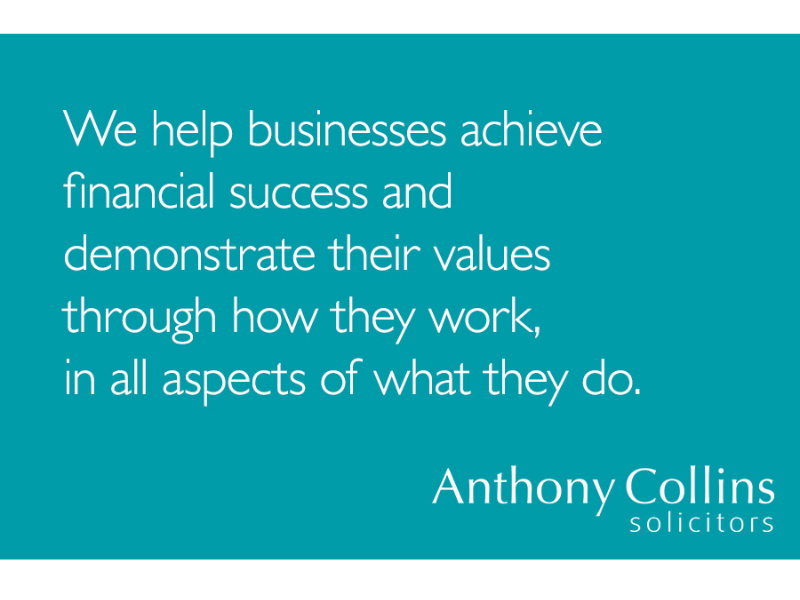Guest contributor: Alice Kinder, Solicitor for Anthony Collins Solicitors LLP (Written 01 December 2020)
As the world seeks to overcome the economic effects of the pandemic, many organisations are recognising the need to become more innovative and creative in their strategies. An important ingredient in this is diversity of thought, drawn from encouraging a diverse pool of talent. How can this be achieved?
Research has consistently shown that socioeconomic background is a strong determinant of an individual’s prospects of accessing and succeeding in their chosen field. It is no secret that people from more affluent backgrounds take a disproportionate number of the best jobs, and that those from lower socioeconomic backgrounds progress less quickly. Where you grow up also matters. A recent study by the Social Mobility Commission showed that of the 24 least socially mobile areas in the UK, almost half were in the North West.
Improving social mobility will not only help talented individuals to access the opportunities they need to move forward, but it will also ensure that the success and development of a region and its businesses are not restricted by its socioeconomic profile. A year or two ago, some employers may have been questioning what this has to do with them. The events of 2020 have changed this; but they have also placed businesses and corporate behaviour under the microscope in a way that we have not seen before.
For better or worse, people are beginning to see the impact that our values can have when those values are demonstrated through our business practices. This is likely to drive many businesses to make positive changes in their operations to demonstrate that their bottom line extends beyond profit. The Social Mobility Foundation has expressly called on the sectors which have benefited most from the COVID-19 pandemic, especially major tech, gaming, and pharmaceutical companies, to make a public commitment to social mobility in 2021.
The Greater Manchester Good Employment Charter provides a fantastic starting point for employers wanting to explore becoming more value-driven. The social mobility agenda underpins many of its principles. To give a few examples:
- addressing social mobility issues at recruitment stage is part of the good practice that will generate a diverse workforce which is reflective of the community it serves;
- recognising that employees from disadvantaged backgrounds may feel less at home in a professional environment is part of the focus on wellbeing that is so fundamental to the development of good employment; and
- fostering a culture that gives all employees the confidence to have a voice regardless of their background is vital to increasing job satisfaction and retention.
So how can employers address the challenge?
Firstly, take the time to gather data. Without data it can be difficult to identify the socioeconomic profile of your organisation and the short and long-term goals that might be realistic. Once you have established your goals, ensure that you demonstrate a clear commitment to them. Ideally it would be beneficial for someone in a senior role to be taking responsibility for making your goals a reality.
Secondly, examine your recruitment processes. Consider whether there are barriers within the recruitment process which are disadvantaging certain people, or whether additional training is required to increase awareness of the unconscious biases that we have. Many organisations are moving towards a blind approach to recruitment, which involves removing certain identifying factors about from a candidate’s application to ensure that selection is truly based on merit rather than background.
Thirdly, consider how you can support employees to make a difference in this area. There is a wealth of social mobility charities as well as schools and universities running vital programmes and mentoring schemes which rely on volunteers. Having worked with many of these programmes, I know that they significantly enhance the resources available to young people and have a huge impact on their aspirations. You may wish to review your time off work policy or think about introducing a formal volunteering policy to enable employees to participate in these types of projects alongside their daily duties.
Finally, do not work in isolation. This is where the Greater Manchester Good Employment Charter is of such value: it is member-based to encourage collaboration, sharing and mutual encouragement. Organisations have much to learn about best practice from their wider network. The accountancy sector, for example, has been far ahead of many others in providing school leaver programmes and apprenticeships. Having regular collaboration with our wider counterparts will help us learn and enable us to support the next generation as much as we can.
If you would like further advice on how you can address the social mobility challenge through your employment practices or on how you can become a value-driven employer more generally, please do get in touch with me by telephone on 0121 214 3615 or by email at Alice.Kinder@anthonycollins.com.

